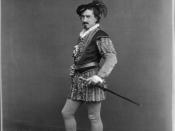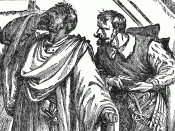This is the question we ask ourselves while reading Shakespeare's Othello. Throughout the play Iago's mission is revealed as trying to strip Othello of all honor, and reduce him to his bestial state. Iago sees Othello as a beat from the beginning of the play and is determined to expose him to everyone. In order for the world to see what Iago already views Othello as, Iago intends to persuade Othello to violate his code of honor; the honor which is the only thing that separates the beasts from the men. Ironically, as Iago tries to coax the beat out of Othello by making him violate his code of justice, we see that Othello's bestiality was there all along.
From the beginning of the play, Iago's view of Othello as a beast is obvious. Iago repeatedly describe Othello in terms of animals. When Iago tries to anger Brabantio when news of his daughter marrying the Moor erupts, Iago describe his new son-in-law in vulgar, bestial terms.
Iago says "Even now, now, very now, an old black ram... is tuping your white ewe." (I.1 lines 89-90) He also states "you'll have your daughter cover'd with a Barbary horse; .you'll have your nephews neigh to you; you'll have coursers for cousins and gennets for germans." (I.1 lines 110-114)
Iago truly thinks Othello a beast, as he even refers to Othello in animal terms when he is by himself. In Iago's soliloquy at the end of Act 1, Iago says that Othello "will as tenderly be led by th'nose; as asses are." (I.3 lines 395-396)
Everyone else sees Othello a man of justice who is spoken of by the Duke as he says, "If virtue no delighted beauty lack, Your son-in-law is far more fair than black" (I.3...
![From the Library of Congress: TITLE: Thos. W. Keene. Othello CALL NUMBER: POS - TH - 1884 .O7, no. 1 (C size) [P&P] REPRODUCTION NUMBER: LC-USZC6-58 (color film copy transparency) RIGHTS INFORMATION: No known restrictions on publication. MEDIUM: 1 print (](https://s.writework.com/uploads/9/94760/library-congress-title-thos-w-keene-othello-call-number-pos-thumb.jpg)


Dating violence
You may wish to change the title to include the word 'Othello' here
4 out of 4 people found this comment useful.